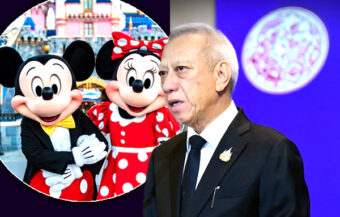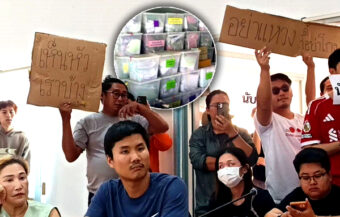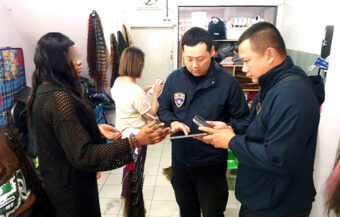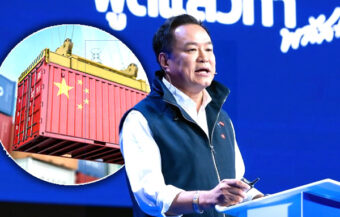Whistleblower Chuwit Kamolvisit warns the new Justice Minister’s ‘working group’ could secretly influence sensitive probes into Senate collusion, Khao Kradong land, and Khanong Phra Airport cases tied to Bhumjaithai Party figures, raising fears of political interference.
Whistleblower Chuwit Kamolvisit has questioned the new Minister of Justice for setting up a so-called ‘working group’ just days into office. He warns it could be a backdoor move to influence high-stakes investigations. The group is linked to probes into Senate collusion, the Khao Kradong land scandal and the Khanong Phra Airport case—each tied, directly or not, to figures close to the Bhumjaithai Party. No clear explanation has been offered. Chuwit has asked the media to quiz the minister and the Prime Minister as to the real aim of the move.
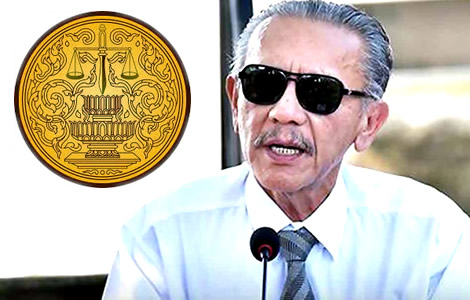
Serial whistleblower Chuwit Kamolvisit has expressed anxiety about the promised impartiality of the Bhumjaithai Party in relation to the administration of justice.
This time, his concerns reference the newly appointed Minister of Justice and a powerful “working group” formed just days into office. He worries that this group may be used to direct or influence two of the country’s most sensitive investigations—one into the controversial 2024 Senate election, and the other into the long-running Khao Kradong land dispute.
On Saturday, October 4, 2025, Chuwit took to Facebook to reveal what he called a shocking move. He stated that the Minister of Justice signed Order No. 194/2025 only seven days into his tenure. The order established a 17-member “Minister of Justice Working Group,” made up of Department of Special Investigation (DSI) officials. According to Chuwit, several of these officials are directly involved in the Senate-Khao Kradong collusion case.
Chuwit raises concern over new ministerial working group involving DSI officials in sensitive probes
However, it is not yet clear from the minister or the government what the purpose or methods of this working group are. The colourful whistleblower has urged the media to begin asking questions and to seek both clarity and assurances.
In particular, Chuwit cited names that raised immediate concern. For example, Mr. Phuchit Karnasut, listed as name number 3, is the Director of Telephone Inspection. He is a key figure in intercepting phone data—data likely vital to the case. Mr. Phongthawat Uamsam-ang, name number 7, works in the Natural Resources and Environmental Crime Division.
He is investigating both the Khao Kradong and Khanong Phra Airport cases. Furthermore, name number 9, Mr. Chaiyaphon Saithawee, is involved in scrutiny cases in Ayutthaya and Ang Thong provinces.
These officials, Mr. Chuwit claimed, are now part of the Minister’s task force. Furthermore, they will hold or have access to sensitive case files. They will certainly have deep knowledge of the inner workings of sensitive probes linked to Bhumjaithai Party figures. Chuwit warned that such appointments risk compromising the investigations.
Experts fear appointment of officials under minister could allow insider access to sensitive party-linked cases
“This is no coincidence,” Chuwit stated. “Officials involved in investigating Senate collusion and land misuse now serve directly under the Minister they should be independent from.”
Moreover, Chuwit pointed out a deeper concern. The Justice Minister hails from Buriram Province, which is closely associated with the ruling Bhumjaithai Party. Supachai Jaisamut, now the Ministry’s spokesperson, has long spoken out about the Khao Kradong case. Chuwit argued that the political affiliations and geographic connections only fuel public unease.
Indeed, public concern has grown in recent days. Observers and indeed MPs fear the investigations could be influenced. According to Chuwit, these appointments could allow insider access to evidence and investigative strategy.
He did not stop there. “If you’re part of the party under investigation and control the police, you can manipulate the process,” Chuwit said. “You can appoint officers handling your case to your team. That way, you get access to every detail and use it to benefit yourself or your party.”
On the other hand, there may be a genuine reason for the minister’s move. It is certainly within his authority to do so. Furthermore, it is being established using proper and open procedures. In short, Mr Chuwit’s concern may be misplaced or premature. However, questions should be asked given the sensitivity of the situation.
Chuwit warns political ties and control of officials could compromise the fairness of ongoing investigations
Significantly, Chuwit—a former massage parlour tycoon—has plenty of experience in dealing with criminal cases. However, that was in the past. He is now a political activist and a man trying to leave behind a better Thailand.
Notably, he has emerged in recent years as an influential figure with an uncanny knowledge of what is going on behind the scenes. He was even commended previously for his work by the Ministry of Justice in the last days of General Prayut Chan-o-cha’s government.
Chuwit is urging journalists to demand answers from both the Minister of Justice and Prime Minister Anutin Charnvirakul. He questioned whether the creation of this working group could be classed as interference in legal investigations.
“Don’t do anything that looks suspicious,” he warned. “The Prime Minister promised not to interfere in the civil service. But this move undermines that pledge.”
At the same time, the Department of Special Investigation (DSI) is pressing ahead with its long-standing probes. It operates under the authority of the Minister of Justice. Certainly, the new Minister of Justice has promised to keep clear of these sensitive investigations. Therefore, a clarification on what this ‘working group’ is and how it will operate may ease concerns if offered.
These investigations focus on suspected criminal activity, including the operation of a closed political network and possible money laundering linked to the land and election issues.
Ongoing DSI probes into closed networks and money laundering continue despite new working group
In parallel, the Election Commission is conducting its own investigation. It is examining potential violations in the 2024 Senate election. So far, 228 individuals are being targeted. Among them are 138 sitting senators and 90 prominent figures, many with links to the Bhumjaithai Party.
This investigation has now moved to the so-called “third level.” A dedicated committee is currently reviewing documents and evidence. Once complete, the findings will be submitted to the full Election Commission. A decision will then be made on whether to proceed with court action.
The political consequences could be enormous. If the case proceeds to trial, it could threaten the survival of the current government. It may even spell the end of Prime Minister Anutin’s political career.
Despite these developments, Anutin remains publicly confident. In a policy address to Parliament last week, he vowed that there would be no interference. He promised the investigations would proceed independently and according to the law. However, he also insisted that no wrongdoing had occurred.
Critics say creation of working group undermines claims of independence in high-profile probes
Nevertheless, critics remain unconvinced. Many believe this move by the Ministry of Justice contradicts the Prime Minister’s statements. The creation of the working group could be seen as a major red flag by those tracking the integrity of the investigations.
For Chuwit, certainly, the picture is already clear. He sees a ruling party scrambling to control investigations that threaten its future. He views the sudden formation of a working group packed with insiders as a tactical move, not an administrative one.
Senate collusion raised by People’s Party MP who says he was intimidated as Commission probe progresses
2024 Senate election enquiries into collusion are a problem for new Prime Minister Anutin Charnvirakul
The next steps by the DSI and the Election Commission will be crucial. So far, both bodies have remained firm in their pursuit of the truth. But questions remain. Will political pressure stall their efforts? Will insider access allow evidence to be compromised?
For now, the stakes are rising. The government stands at the edge of a legal and political cliff. And as Chuwit continues to sound the alarm, the country is watching closely.
Join the Thai News forum, follow Thai Examiner on Facebook here
Receive all our stories as they come out on Telegram here
Follow Thai Examiner here
Further reading:
Election Commission moves forward steadily with Election Collusion case linked to Bhumjaithai Party
Bombshell news as Bhumjaithai Party leadership is summoned by Election Commission over Senate poll













